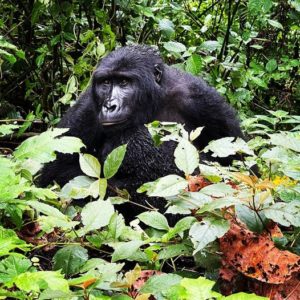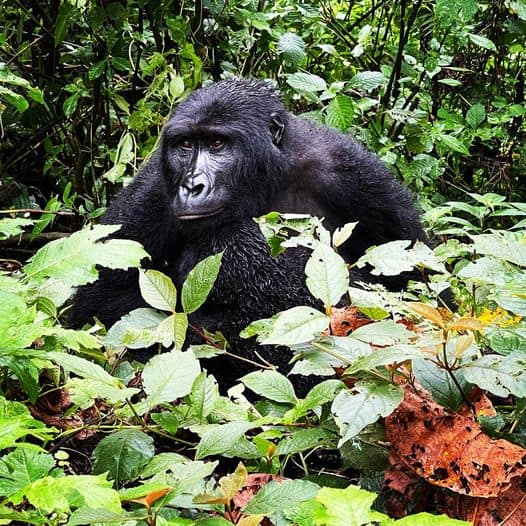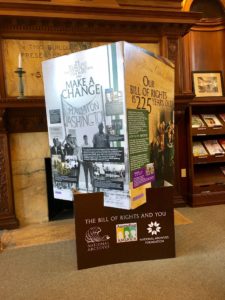 A long flat crocodile lay still on the shore with its mouth wide open. Two unsuspecting elephants came along and when they noticed it, perked up their ears and walked backward before fleeing in the other direction. Seeking revenge for the scare, their friend trotted down, ears confidently flared, and chased the croc into the water. Moving along we came across a canal that appeared as though one could walk along it, stepping on the muddy boulders. Upon closer examination, it turned out to be a trench full of about 20 hippos, creatures that we discovered are like the squirrels of Queen Elizabeth Park – ubiquitous. Back at the lodge, I sat on a rock for a while, as the baboons surrounded me, not threatening, but timidly coming closer, staring and voicing occasional barks.
A long flat crocodile lay still on the shore with its mouth wide open. Two unsuspecting elephants came along and when they noticed it, perked up their ears and walked backward before fleeing in the other direction. Seeking revenge for the scare, their friend trotted down, ears confidently flared, and chased the croc into the water. Moving along we came across a canal that appeared as though one could walk along it, stepping on the muddy boulders. Upon closer examination, it turned out to be a trench full of about 20 hippos, creatures that we discovered are like the squirrels of Queen Elizabeth Park – ubiquitous. Back at the lodge, I sat on a rock for a while, as the baboons surrounded me, not threatening, but timidly coming closer, staring and voicing occasional barks.
My trip to Uganda revolved around animals – observing them by boat, truck and on foot, at sunrise and sunset, and after dark with a spotlight. I maintain a life goal to travel once a year to a country I’ve never been to before, and safaris combine two of my favorite things: adventure travel and animals. For me, nothing compares to seeing lions frolic, monkeys swing from trees, and zebras and giraffes graze in the wild. What drew me to Uganda in particular was the opportunity to bushwhack through the dense forest, to spend time with gorillas and chimpanzees up close and personal.
After a week without television, news, and 24/7 social media, I started tuning out worries about life at home, but leave it to COVID to snap you back to reality. On the way to Lake Mburo we stopped for the COVID tests required for our return flights. The organizers explained that it cost $50.00 for the swab and results within 24 hours. At the combination clinic and morgue complex a doctor greeted us and broke the news that they were no longer handling tourists’ tests and we’d have to go to a private clinic, for a significantly steeper price. A private clinic sounded appealing, in light of the garbage pile on one side of us, and lineup of uniformed prisoners awaiting tests on the other, but we had enough experience with Ugandan logistics to fear that this would not be straightforward and would cost precious time, so we pleaded for an exception.
After some failed negotiations we sulked back to the dirt parking lot. The doctor followed us though, and after a whispered conversation with our driver, asked us in hushed tones, “How much do you want to pay?” He offered a “discount” but suggested we go offsite. It seemed fishy, but we didn’t have much choice. We got in our vehicle and followed our new friend out of the gates, down the road past the bustling market, finally turning onto a dirt road, and driving up onto the hilly green of a golf course.
Outside of the van window, the doctor began preparing paperwork, when two young boys came along and interrupted. He assured them we were “just chilling,” and they warned that the golf course prohibited “just chilling,” but for a small fee they might turn a blind eye. Our briber got bribed, mid-bribery, but of course we forked over the 20,000 shillings the boys demanded. Resuming the tests, the gentleman handed us swabs and vials out of his pocket, and asked the driver to borrow his hand sanitizer. One by one he jabbed our nostrils through the van window, each time changing gloves and sanitizing, declaring, “You see, I am very professional!” After paying up we parted ways and waited for the test results to be delivered via WhatsApp.
Many folks feared the dangers of my voyage to Uganda, a land full of wild animals, potential disease, and a history of war and political instability. I felt safe during every moment of the trip, aside from this one sketchy encounter with perhaps the most dangerous predator, a fellow human. I had COVID and Yellow Fever vaccines, mosquito nets and DEET for malaria prevention, and experienced guides and trackers. I mainly worried about other people. Uganda’s history breaks the heart. Preparing for the adventure, I checked out The Bradt Travel Guide: Uganda and the Pimsleur Swahili CDs, but I also watched General Idi Amin Dada: a Self Portrait (the fictionalized Last King of Scotland may be more accessible), and read First Kill Your Family: Child Soldiers of Uganda and the Lord’s Resistance Army, learning about atrocities beyond imagination.
Hundreds of thousands died under the reign of Amin, followed by hundreds of thousands more being murdered, abducted and tortured by Joseph Kony’s Lord’s Resistance Army. It defies belief; the LRA rebels alleged to fight for the Ten Commandments, yet killed, raped, and stole mercilessly, elevating Kony as a prophet and thinking themselves literally bulletproof thanks to God’s protection. An Atlantic article entitled “The Bizarre and Horrifying Story of the Lord’s Resistance Army,” by Max Fisher goes into more detail. Not everyone can stomach such content, however keep in mind we do teach about the Holocaust in schools, and read accounts of that tragedy, aiming to learn lessons from history and “never forget.”
Most of this horror occurred in the north, closer to the South Sudan border and far from the safari and trekking routes tourists follow. A devastatingly poor country, Uganda depends on animal-based tourism, and those in the industry suffered greatly while unemployed during COVID times; travelers are just starting to return. Both forest trackers and lodge security guards carry AK-47s, not really for killing, but for warning and scaring off predators, (whether wild animals or people). A former British protectorate, most people speak English, and those I met were incredibly hospitable. Beers cost less than a dollar and lodge cabanas are more spacious than US hotel rooms.
For so many reasons, I prefer safari travel to sightseeing in America or Europe. After watching animals all day, with expert guides explaining their habits and behavior, my travel-mates and I questioned, “Why doesn’t everyone want to come here?!” After a power outage, or helping push a truck stuck in the mud, or using a roadside outhouse, we would admit, “Well, this isn’t for everyone.” I can’t get enough though; I hear the Congo and Rwanda also have gorilla treks… both remain high on my “bucket list.”
Lydia Sampson is the Assistant Director at the Morrill Memorial Library in Norwood, MA. Look for her article in the October 21, 2021 issue of the Transcript and Bulletin.




